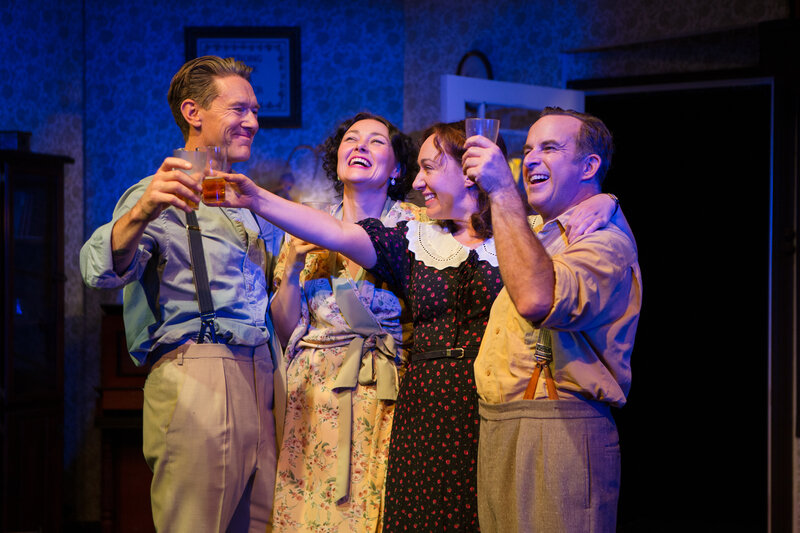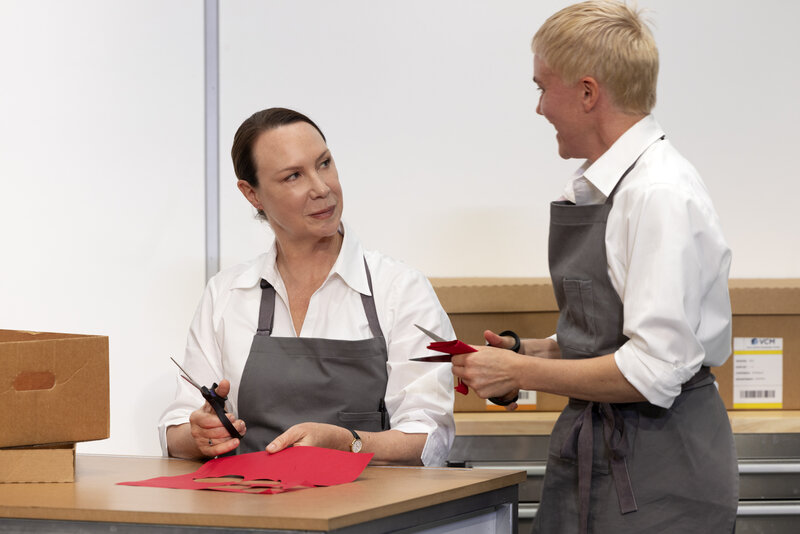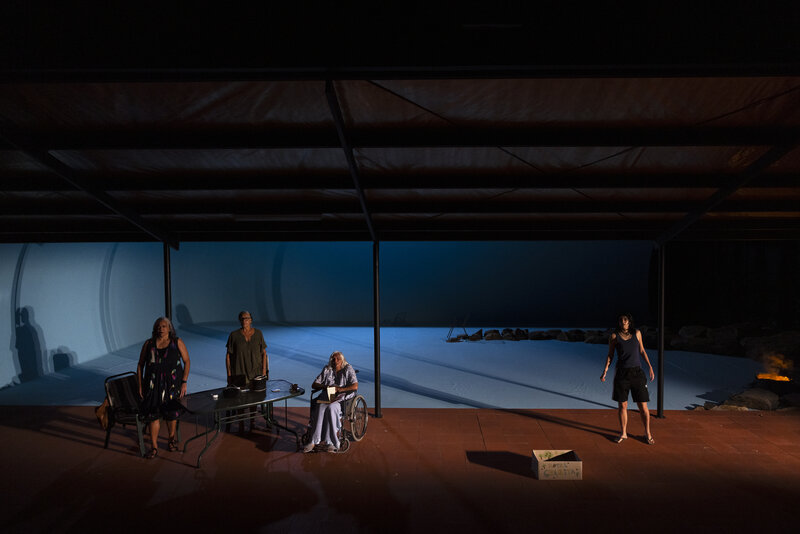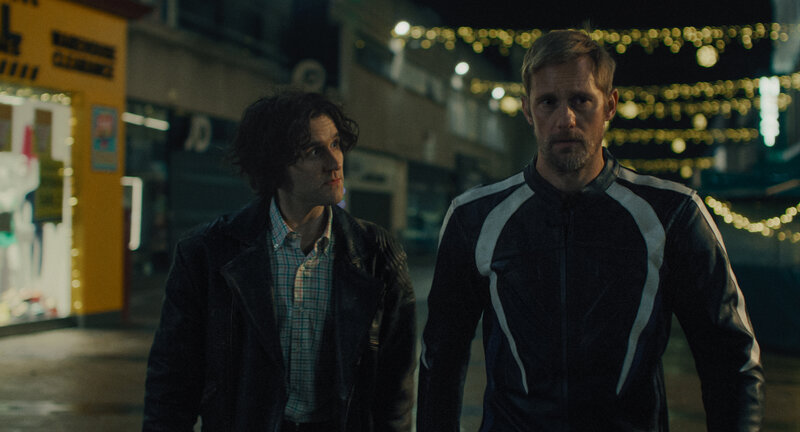Of Mice and Men, is an adaptation for the theatre of a 1937 novella of the same name, both written by John Steinbeck. The original production won Best Play in 1938 from the New York Drama Critics Award, and since has been adapted many times for other mediums – radio, television, opera and twice for the cinema: 1939, with Burgess Meredith as George Milton, and Lon Chaney Jnr as Lennie Small; 1992, with Gary Sinise as George and John Malkovich as Lennie. Recently, the play was revived for the New York stage with James Franco as George and Chris O’Dowd as Lennie – it was screened as part of the National Theatre Broadcasts around Australia. It tells the story of two bindlestiffs – misplaced migrant ranch workers in California during the era of the Great Depression. (The Grapes of Wrath is another Steinbeck book – greater, I believe – that deals with this great natural disaster and the people caught up in it.)
 Sport for Jove, under the direction of Iain Sinclair have mounted a more than handsome production of this great text. The design, by Michael Hankin, of a dirt floored weathered wood bunk house, interleaved with supporting poles, with paling slatted details and furniture for beds, is assisted in creating a patina of poverty and struggle with the atmospheric lighting of Sian James-Holland. The subtle sound design by Nate Edmondson adds, and carefully impinges on our consciousness to give depth of reality to the world of the play. The costumes, also, by Mr Hankin, with assistance from Georgia Hopkins, are highly personalised for each of the characters and have a veracity that is achingly sad in its beauty of detail. Mr Hankin, as with his recent work on Deathtrap, in great form.
Sport for Jove, under the direction of Iain Sinclair have mounted a more than handsome production of this great text. The design, by Michael Hankin, of a dirt floored weathered wood bunk house, interleaved with supporting poles, with paling slatted details and furniture for beds, is assisted in creating a patina of poverty and struggle with the atmospheric lighting of Sian James-Holland. The subtle sound design by Nate Edmondson adds, and carefully impinges on our consciousness to give depth of reality to the world of the play. The costumes, also, by Mr Hankin, with assistance from Georgia Hopkins, are highly personalised for each of the characters and have a veracity that is achingly sad in its beauty of detail. Mr Hankin, as with his recent work on Deathtrap, in great form.
What furthers the convincing aesthetics of this production is the wonder of the casting of the actors – all appear stunningly right and ‘real’ for the time and place of the play’s circumstances. Add to that, a quality of performance, both individually and ensemble, and a truly great night in the theatre can be had. Andrew Henry, playing Lennie, creates a figure of such pathetic innocence that the inevitable wind of the mechanisms of tragedy become almost unbearable to anticipate and watch – physically, vocally and emotionally the judgement of the choices by this actor are worth the cost of your ticket alone. Supported by Anthony Gooley, playing George, Lennie’s guardian and friend, there is revealed a simpatico of the creative energies of these two actors, and it is touchingly powerful, all the more because it is a rarity to see on our stages. Andre de Vanny, as the restless and insecure Curley, makes a special mark with his characterisation whilst all else: Laurence Coy, Christopher Stollery, Anna Houston, Charles Allen, John McNeill, Tom Stokes and Terry Serio (who also creates atmosphere with his guitar) are true and grounded in the storytelling responsibilities that they give.
Mr Sinclair, his work last seen in Sydney being the ill-starred production of Mojo, for the Sydney Theatre Company (STC), has lovingly created a production of much deliberate detail of acting and musical pacing of the ‘score’ of the playwright. He lets the play breathe, take its time. He has the courage to allow the action of the play to develop in the gaps between the words, and the speeches, scenes, of Steinbeck’s two act play. The opportunity, then, is unconsciously afforded the audience to endow and identify the characters and the situations they find themselves in, and this permitted opportunity to create with the actors becomes a huge part of the success of the journey in the storytelling. The audience become actively complicit in the events on the stage – we viscerally have been induced to care very personally – the tragedy is ours as well.
Sport for Jove, under the Artistic Directorship of Damien Ryan, once again demonstrates the triumph that great care and a love of the theatre has, as an essential part of our culture, our family humanity. The innate necessity we have as a species to tell stories to explain the world about us. To assure us that we are not alone in this world. It is a company willing to share around that medium’s responsibilities to create the work with equal value. It seems all the collaborators, in this work, have been given equal opportunity and respect to make a contribution to the production, and daringly, invite the audience to be part of that creativity. The writer appears to be in a god-like centrality to the inspiration of the company. Respected, not used. Not ever abused. Where other organisations in Sydney have veered off the path of audience appreciation and artistic respect, Sport for Jove consistently presents work that is innovative and yet accessible. Loving and loved. Rewarding. Rewarding for the audience and it seems for the artists.
Spend your money wisely and go to the Reginald to see the best work on stage in Sydney at the moment. Interesting that the Seymour Centre has housed the two most exciting, consistent Performing companies under its roof: Sport for Jove and Squabbalogic – more power to their recognition. It would be great for the funding bodies to view their record and support, don’t you think? Grounded in the Reginald season, this year, is certainly the next best thing I have seen in the theatre this year so far.
 The writing in this play is a master class of plot construction and character development. One leant into the ear of a friend watching during the tremendous applause of thanks at the conclusion of this performance and said: “I wonder how many of our young Australian playwrights have read this play?” Whatever one might debate about the content of the play (which, for me, is humanistically a triumph of values, always relevant), the CRAFT is fundamental and not often seen enough in our contemporary playwriting. Mr Sinclair is an associate artist and resident dramaturg for Playwriting Australia, I hope he has encouraged his would-be craftsmen and women/artists to see this play and to read it. To read the masters of the past, to study the masters of the past, and so stand on the shoulders of their greatness. Build from those who have gone before – they have made, believe it or not, invented ‘the wheel’ already!
The writing in this play is a master class of plot construction and character development. One leant into the ear of a friend watching during the tremendous applause of thanks at the conclusion of this performance and said: “I wonder how many of our young Australian playwrights have read this play?” Whatever one might debate about the content of the play (which, for me, is humanistically a triumph of values, always relevant), the CRAFT is fundamental and not often seen enough in our contemporary playwriting. Mr Sinclair is an associate artist and resident dramaturg for Playwriting Australia, I hope he has encouraged his would-be craftsmen and women/artists to see this play and to read it. To read the masters of the past, to study the masters of the past, and so stand on the shoulders of their greatness. Build from those who have gone before – they have made, believe it or not, invented ‘the wheel’ already!
P.S. There is in this production a real dog on the stage. I note, amused, that many other commentators of this production have made mention of it. Here is mine. The reality of this dog, gave me an unequivocal entrance point to believe in what I was watching, what was going on. This dog was all that the other characters said it was – smelly and old – method acting at its best!? It was, I am sure, the live duck in The Wild Duck at Belvoir, even behind that glass box, a few years ago – truly convicted it was a bewildered duck, I thought – that helped me embrace that production, and why, perhaps, I didn’t buy into The Dapto Chaser at the SBW Stables as much as others – a mimed dog is no emotional substitute for the real thing, I reckon. Something serious to ponder. I am sure the necessity of a live sheep in Sam Shepard’s Curse of the Starving Class, is hindrance to its been seen regularly, if at all. I shudder to imagine what we may see in the upcoming Edward Albee’s The Goat or Who is Sylvia?
Ha, ha.
Company: The Seymour Centre and Sport for Jove
Venue: Reginald Theatre, The Seymour Centre, Chippendale, Sydney
Dates: 14 July 14 – 1 August 2015
Kevin Jackson
For more of Kevin Jackson’s theatre reviews, check out his blog at Kevin Jackson’s Theatre Diary

David Edwards is the former editor of The Blurb and a contributor on film and television




